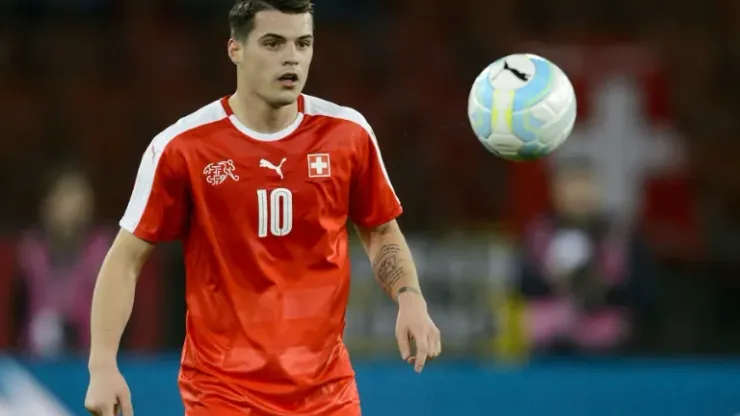Zurich (AFP) – Granit Xhaka’s transfer to Arsenal for a fee reported to be about 40 million euros means there is pressure on the Swiss midfielder to prove his worth at the European Championship finals.
Despite being just 23, the rising star has been capped 41 times, with former Swiss national coach Ottmar Hitzfeld branding Xhaka a “young (Bastian) Schweinsteiger,” in a widely quoted comparison to the German football great.
Xhaka’s performances with the Bundesliga’s Borussia Monchengladbach and previously with Swiss club Basel made him a target for English Premier League clubs.
Arsenal believe they have one of the best deals of the transfer window. Liverpool and Bayern Munich were also watching the Swiss lynchpin.
Xhaka will be a key player in Switzerland’s drive to beat low expectations and make a run at the European Championship.
– Facing his brother –
Xhaka was born in Switzerland, but like other key players on the Swiss side, has Albanian-Kosovar roots.
His parents were among some 300,000 Kosovars who moved to Switzerland to escape the territory’s brutal independence war with Serbia in the 1990s.
That has put Xhaka along with Swiss teammate and Stoke City star Xherdan Shaqiri at the centre of a touchy — and sometimes xenophobic — debate in the federation over the national side’s identity.
Countless Swiss fans simply want to see the best possible players on the pitch.
But the country, perhaps more so than some other European nations, is known for anti-migrant sentiment which has at times seeped into public discussion about the football team.
A 2012 World Cup qualifying match against Albania was a flashpoint moment.
With Switzerland leading 2-0 in the 84th minute, Xhaka had what appeared to be an uncontested shot at the Albanian net, but sent the ball softly towards the keeper.
Swiss TV commentator Sascha Ruefer questioned if Xhaka had missed deliberately because of his Albanian roots.
The comments were roundly rejected, with the team and most media dismissing any doubts about Xhaka’s allegiance.
But Xhaka has also played a role in fuelling speculation that he may prefer to compete with another nation’s crest on his chest.
In multiple media interviews, he has made clear that full recognition of Kosovo’s national team by FIFA could inspire him to play for the territory where his parents were born.
Kosovo is not a United Nations member and FIFA has only cleared its team to compete in friendlies.
Xhaka will therefore be playing for Switzerland when their Euro 2016 bid starts on June 11 against Albania, a team that could include up to 6 Swiss-born players, including Xhaka’s brother, Taulant.
200+ Channels With Sports & News
- Starting price: $33/mo. for fubo Latino Package
- Watch Premier League, Women’s World Cup, Euro 2024 & Gold Cup
The New Home of MLS
- Price: $14.99/mo. for MLS Season Pass
- Watch every MLS game including playoffs & Leagues Cup
Many Sports & ESPN Originals
- Price: $10.99/mo. (or get ESPN+, Hulu & Disney+ for $14.99/mo.)
- Features Bundesliga, LaLiga, Championship, & FA Cup
2,000+ soccer games per year
- Price: $5.99/mo
- Features Champions League, Serie A, Europa League & Brasileirāo
175 Premier League Games & PL TV
- Starting price: $5.99/mo. for Peacock Premium
- Watch 175 exclusive EPL games per season






